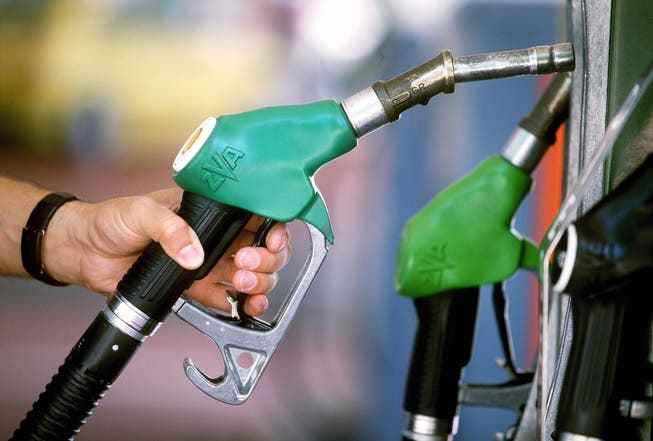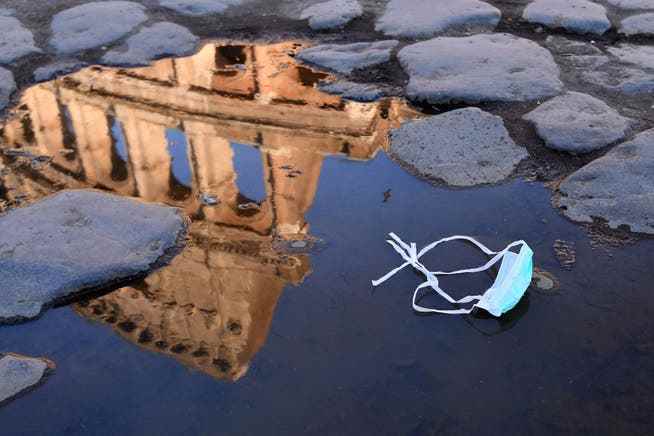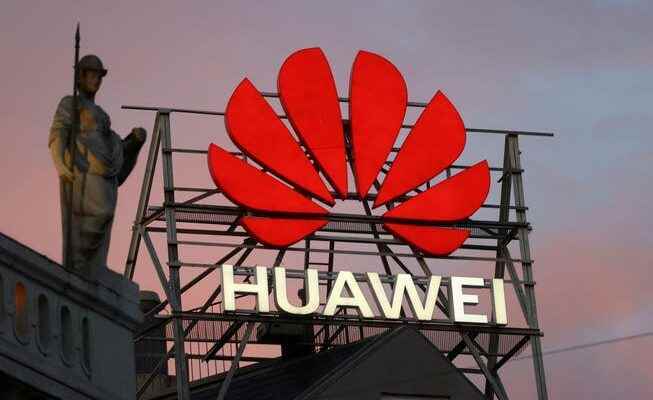Chinese tech giant Huawei closes online shop in Russia
Huawei is one of the largest telecommunications equipment suppliers in the world.
(dpa) Although Beijing is not officially involved in the sanctions against Moscow, the Chinese technology group Huawei has closed its Internet business in Russia. The online shop has not been usable since the beginning of the week, Russian media reported on Wednesday. Huawei itself had previously announced the end of online sales on its Russian-language website. A reason was not given.
Orders can therefore be placed neither via the website nor via the app. However, orders that have already been received would still be processed, as would warranty maintenance, the company assured. The group did not provide any information as to whether it was planning a complete withdrawal from the Russian market.
After the beginning of the Russian war of aggression against Ukraine at the end of February, Western states imposed sanctions on Moscow specifically restricting the import of technologies. In this conflict, Russia has always pointed to China as a possible alternative in this area. According to media reports, however, deliveries of technological goods from China to Russia have been declining since the beginning of the war. Huawei is one of the largest telecommunications equipment suppliers in the world.
Inflation rises to over 10 percent in industrialized countries
tsf. Inflation continues to rise in the industrialized countries. In the OECD, the club of presumably highly developed economies, the inflation rate rose to 10.3 percent in June 2022. In May it was still 9.7 percent. The increase is the strongest since 1988.
Food and energy continue to drive inflation, the OECD said on Wednesday. Prices have risen in all countries except Germany, Japan and the Netherlands. Every third OECD country has a double-digit inflation rate. Turkey has the highest rate of 78.6 percent. Inflation is lowest in Japan at 2.4 percent.
Food prices climbed 13.3 percent in the OECD (May: 12.6 percent). This is the sharpest increase since July 1975. Energy prices rose by 40.7 percent in June (May: 35.4 percent). Core inflation (excluding food and energy) was 6.7 percent in June.
Inflation in Switzerland is still 3.4 percent

Fuels are fueling inflation, but prices here have fallen slightly compared to the previous month.
tsf. In Switzerland, inflation did not rise any further in July. The national consumer price index (CPI) remained unchanged in July 2022 compared to the previous month at 104.5 points (December 2020 = 100). Compared to the corresponding month of the previous year, inflation was 3.4 percent.
According to figures published by the Federal Statistical Office (BfS) on Wednesday, it was mainly imported goods that became more expensive in July. In the reporting month they cost 8.4 percent (June 8.5 percent) more than a year ago. For domestic goods, meanwhile, annual inflation was only 1.8 percent (1.7 percent). Core inflation, which excludes developments in energy, fuel and fresh seasonal produce, rose 2 percent from the previous month.
The harmonized index of consumer prices (HICP), which compares inflation here with that in European countries, rose 0.1 percent month-on-month in July, giving an annual inflation rate of 3.3 percent.
Unions demand cost-of-living adjustments
According to a media release by the Swiss Confederation of Trade Unions, inflation will remain at a high level of 3.4 percent and thus weigh heavily on the purchasing power of working people and pensioners. Without cost-of-living compensation, families were threatened with real wage losses of several thousand francs. Purchasing power must now be secured: In addition to the urgently needed general wage increases, the increase in premium reductions and the rapid adjustment to inflation in AHV pensions must be implemented as a matter of urgency in the autumn session of parliament. Because the expected increase in health insurance premiums put an additional burden on households.
ECB supports Italy with billions from the first line of defense

The ECB releases funds from the pandemic program for Italy.
(Bloomberg) The European Central Bank has appeared to be buying billions of dollars in bonds to shield Italy and other southern euro members from unwelcome market developments since activating its first line of defense against speculation a month ago.
Data released on Tuesday shows a significant use of funds freed up by maturing bonds in the pandemic program portfolio. This suggests that the instrument that the central bank intended as the first reaction to market turbulence was used.
The statistics, which are only available on a two-month basis, show that net holdings of German, French and Dutch bonds fell by 18.9 billion euros through July. Net purchases of bonds from Italy, Spain, Portugal and Greece totaled 17.3 billion euros.
The numbers are the first hard data to show the ECB’s intervention in bond markets after a surge in bond yields in June forced President Christine Lagarde to call an emergency meeting where officials agreed on the need for a response.
“It appears that the ECB has already activated its first line of defense,” said Christoph Rieger, Head of Rates at Commerzbank AG. “This is by far the largest reduction in German holdings since the ECB began quantitative easing, and more than we anticipated.” As a first step, Council members agreed to flexibly reinvest the repayments due on their €1.66 trillion asset purchase program.
To organize the bond purchases, they divided the euro area into three categories: donors, including Germany, France and the Netherlands, recipients, consisting of Italy, Greece, Spain and Portugal, and so-called neutrals.
Lagarde described this flexibility as the ECB’s first line of defense against market volatility that threatens the transmission of monetary policy. In addition, a newly created instrument for the purchase of debt instruments is available in the background if stronger interventions should become necessary.
Italy has been the focus of investors since Prime Minister Mario Draghi’s government fell last month and snap elections were put on the agenda for late September.
Oerlikon increases strongly
tsf. The industrial group Oerlikon is making rapid progress. After an already good first quarter, it continued to grow in the months of April to June. In the first half of the year, he increased sales by 19.7 percent to CHF 1.43 billion compared to the same period last year. As the group further announced on Wednesday, new orders increased by 21.2 percent to a value of CHF 1.56 billion.
Operating profit before depreciation and amortization (Ebitda) rose by 22.2 percent to CHF 247 million. The corresponding Ebitda margin improved from 16.9 to 17.2 percent.
The bottom line was a net profit of 88 million francs, which corresponds to an increase of 23.4 percent compared to the same period last year.
Chairman of the Board of Directors Michael Süss, who took over the operational management of the group from July 1, 2022 from the retiring CEO Roland Fischer, speaks of “strong” growth in the announcement. In the Surface Solutions Division, Oerlikon has seen increased demand, although many end markets are still suffering from supply chain problems.
BMW earns less
(dpa) The car manufacturer BMW has to accept a drop in profits in a difficult economic environment. Earnings before interest and taxes in the group in the second quarter of 3.43 billion euros were almost a third below the previous year’s figure, as the company announced on Wednesday. However, the Munich-based company had benefited from the release of antitrust provisions in the amount of one billion euros a year ago, and in the past quarter there were also billions in special costs for the majority takeover of the Chinese joint venture BMW Brilliance Automotive.
After all, BMW earned more than many analysts expected in the second quarter. For the year as a whole, BMW lowered its sales forecast for passenger cars due to the difficult economic environment. Group sales grew in the second quarter despite the decline in auto deliveries. Mainly thanks to the acquisition in China, it increased by 21.6 percent year-on-year to almost 34.8 billion euros. The bottom line was the consolidated surplus at 3.05 billion euros. A year ago it was 4.79 billion euros.
Commerzbank earns a surprising amount
(dpa) Germany’s Commerzbank posted a surprisingly high profit in the second quarter thanks to significantly higher earnings. The bottom line was a surplus of 470 million euros, as the company announced on Wednesday. That was 100 million more than what analysts had expected on average.
A year earlier, costs for job cuts and branch closures had torn Commerzbank deep into the red with 527 million euros. For 2022, CEO Manfred Knof is still aiming for a surplus of more than one billion euros and wants to distribute 30 percent of the profit attributable to shareholders as a dividend.
In the second quarter, revenues – the bank’s total income – jumped 30 percent year-on-year to 2.4 billion euros. At the same time, the bank put aside 106 million euros for possible loan defaults, a good fifth more than in the previous year. For the year as a whole, the Management Board assumes risk provisions for impaired loans of around EUR 700 million.
